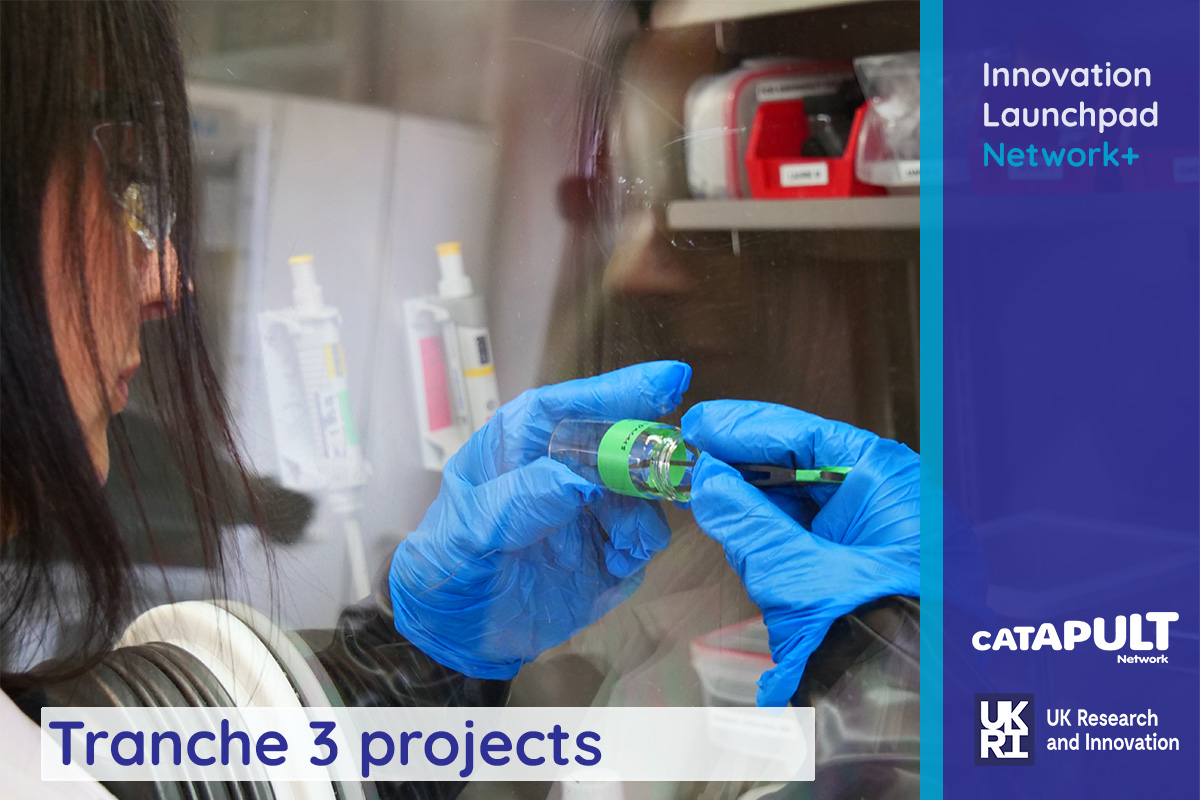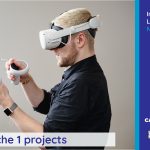Researcher in Residence: Latest round of research projects announced by the Innovation Launchpad Network+

The third round of academics for the Innovation Launchpad Network’s Researcher in Residence scheme have been confirmed, with 27 world class projects poised to make a huge impact to industry and to the UK’s strategic goals.
Across all three phases of the Researcher in Residence scheme, the ILN+ team have been inundated with enquiries from academics from institutions up and down the UK.
Since launching the Innovation Launchpad Network+ and opening the call for the RiR scheme in October 2022, more than 350 enquires have been sent, 275 Expressions of Interest and eventually, 107 world class research projects spanning three themes: Net Zero, Resilience and Healthcare and Wellbeing. All 9 Catapults from the Innovate UK Catapult Network are represented in a fascinating portfolio of applications.
Following an intensive reviewing process with the ILN+ Investigators reviewers team, the Innovation Launchpad can reveal the awarded Researcher in Residence proposals below.
Net Zero
Stavros Karamperidis – University of Plymouth/Connected Places Catapult – Informed based investment to support alternative fuel and power sources for ports and vessels serving the UK economy
Grant Wilson – University of Birmingham/Energy Systems Catapult – Assessment of strategic stores of energy in Net Zero energy systems
Weiqi Hua – University of Birmingham/Energy Systems Catapult -Digitally-Enabled Flexibility Assessment of Multi-Energy Systems Toward
Carolina Font Palma – University of Hull/ Energy Systems Catapult – Low-carbon hydrogen systems to reach Net Zero
Jie Zhang – University of Bristol/High Value Manufacturing Catapult (Advanced Manufacturing Research Centre) – Ultrasonic array inspection for surface integrity of metallic components and incipient defects in composite components
Edward McCarthy – University of Edinburgh/High Value Manufacturing Catapult (Advanced Manufacturing Research Centre) – Increasing the TRL Levels of Thermoplastic Liquid Composite Moulding and Fibre Splicing for Upcycling
James Griffin – Coventry University/High Value Manufacturing Catapult (Manufacturing Technology Centre) – Real-time Monitoring of Laser Shock Peening using Acoustic Emission Sensors and FLIR camera as a multispectral approach
Andrew Shires – University of Leeds/High Value Manufacturing Catapult (Manufacturing Technology Centre) – Laser surface texturing for aerodynamic drag reduction
Bahman Ghiassi – University of Birmingham/High Value Manufacturing Catapult (National Composites Centre) – Development of ‘best practice guides’ for ultra-low carbon precast concrete constructions using alternative textile reinforcements
Ketan Pancholi – Robert Gordon University/High Value Manufacturing Catapult (National Composites Centre) – Advancing Next-Generation Cryogenic Hydrogen Storage Tanks: Enhancing Poly (arylene ether ketone) Synthesis for Composite Matrix Tuning and Carbon Fibre
Martin Jackson – University of Sheffield/High Value Manufacturing Catapult (National Manufacturing Institute of Scotland) – HOLLOFORM: Creating new design opportunities for titanium waste streams through novel FAST processing coupled with radial forging, incremental flow forging and inertia friction welding
Amir Siddiq – University of Aberdeen/High Value Manufacturing Catapult (National Manufacturing Institute of Scotland) – A computational framework to understand and predict microstructure dependent sporadic fracture behaviour in near beta titanium alloys.
Wrik Mallik – University of Glasgow/High Value Manufacturing Catapult (National Manufacturing Institute of Scotland) – Data-driven manufacturing of energy-efficient porous-coated wind turbine blades
Faezeh Shalchy – Heriot-Watt University/High Value Manufacturing Catapult (Warwick Manufacturing Group) – A New Concept of Meta-Materials: Sustainable Manufacturing of Energy Absorbing Lattices
Lin Wang – University of Nottingham/Offshore Renewable Energy Catapult – Enhancing Reliability and Reducing Costs of Floating Wind Turbine Support Structures
Christian Devenish – Keele University/Satellite Applications Catapult – Linking earth observation to in-field biodiversity metrics – towards scaling up and automating ecosystem assessments
Resilience
Rachel Granger – De Montfort University/Connected Places Catapult Alternative Economic Spaces and Practices of Resilience
Ian Heptinstall – University of Birmingham/Connected Places Catapult – Embedding innovation into procurement and project management practices
Seyed Mojtaba Hoseyni – University of Sheffield/Energy Systems Catapult in collaboration with High Value Manufacturing Catapult (Warwick Manufacturing Group) – Enhancing Resilience in Net Zero Energy Systems: A Comprehensive Framework for Early-Stage Design
Morteza Tabatabaeipour – Ulster University/High Value Manufacturing Catapult (National Composites Centre) – Robotic Fusion: Integrating Machine Vision and Ultrasonic Inspection for Enhanced Composite Material Analysis
Aakash Bansal – Loughborough University/Satellite Applications Catapult-Small Planar Antennas for CubeSats (SPACE) – Researcher in Residence
Jasim Uddin – Cardiff Metropolitan University/Satellite Applications Catapult – A Resilient Non-terrestrial Satellite Communication Infrastructure to Enhance Reliability and Robustness
Healthcare and Wellbeing
Junming Zeng – Imperial College London/High Value Manufacturing Catapult (Centre for Process Innovation) – Dengue Shock Classification And Prediction wEarable (D-SCAPE) V3
Gregory de Boer – University of Leeds/High Value Manufacturing Catapult (Manufacturing Technology Centre) –Multiscale mixed lubrication and wear of laser textured surfaces: A framework for in-silico trials of orthopaedic hip replacements
Emmanouil Papadakis – University of Huddersfield/Medicines Discovery Catapult – A comprehensive knowledge graph about schizophrenia: bridging biology, pharmacology and chemistry
Danielle Brain – University of Liverpool/Medicines Discovery Catapult -Developing a 3D model for the immunocompatibility assessment of subcutaneously delivered therapeutics
Ian Copple – University of Liverpool/Medicines Discovery Catapult – Biomarker discovery to enable the non-invasive monitoring of NRF2 activator therapies in humans
Paul Stimpson, Communications Lead for the Innovation Launchpad Network+, said: “Working with the Innovate UK Catapult Network, EPSRC and some of the UK’s leading universities, we had high hopes for this scheme but our expectations have been exceeded over the last two years.
“The potential impact and the outputs we are already seeing from these projects is game-changing. You will be hearing more about this as our ‘It’s Not Not Rocket Science’ podcast gathers pace.”



